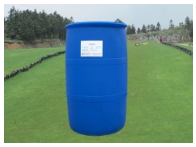The surfactant can reduce the interfacial tension and make the wetting angle θ close to zero, and the solid powder can be spontaneously dispersed in the surfactant solution. At the same time, surfactant can help the liquid to wet the inner surface of solid, so that the liquid can penetrate into the channels and voids between the aggregates in the particles, provide a certain pressure, and under the action of mechanical force, the strengthening bond force of particle aggregates is destroyed. At the same time, surfactants can help to grind, reduce the surface energy of particles, prevent the surface of the damaged surface from bonding, so as to prevent particles from coalescence.

Biosurfactants are widely used in industry and agriculture, medicine and health and environmental protection. It has the characteristics of biodegradation and low toxicity. However, up to now, in terms of economic benefits, it has not been able to compete with synthetic chemical products on the market, so much work needs to be done.
Surfactants are one of the main components of detergent detergents. Except for special purposes, these products are discharged into the environment directly or after being treated by sewage treatment plants. However, anionic surfactants, which are difficult to biodegrade, play an important role in detergents. The discharge of surfactant containing wastewater not only directly harms the aquatic environment, kills microorganisms in the environment, inhibits the degradation of other toxic substances, but also leads to the reduction of dissolved oxygen in water, especially the nitrogen and phosphorus containing surfactants will cause eutrophication of water. When the concentration of surfactant in wastewater reaches a certain concentration, it will affect many processes such as aeration, sedimentation, sludge nitrification, etc.
1) It is urgent to improve the production process of microbial surfactant and reduce the production cost.
2) We should strengthen the genetic research of strains and produce more effective surfactants by genetic engineering recombinant strains;
3) Carry out comprehensive toxicological experiments to ensure safety.
As grinding aids, surfactants also play a lubricating role, which can increase the specific surface area of the products, shorten the grinding time and improve the grinding efficiency. The mechanism can be summed up as follows: reduce the crushing energy, increase the probability of brittle fracture, prevent plastic deformation, control the flocculation and aggregation of fine particles, strengthen dispersion and adjust the rheological properties of slurry.